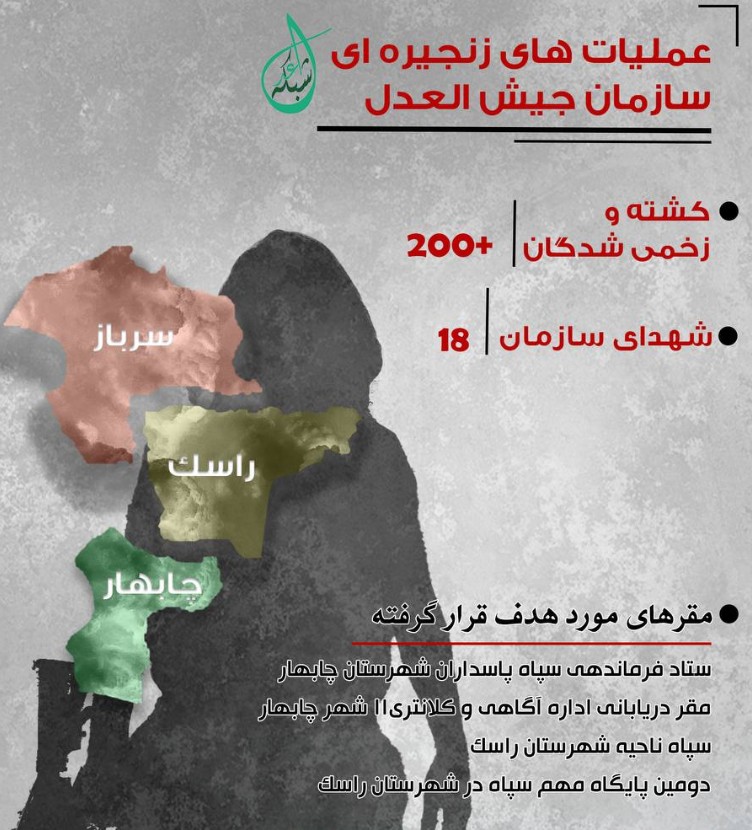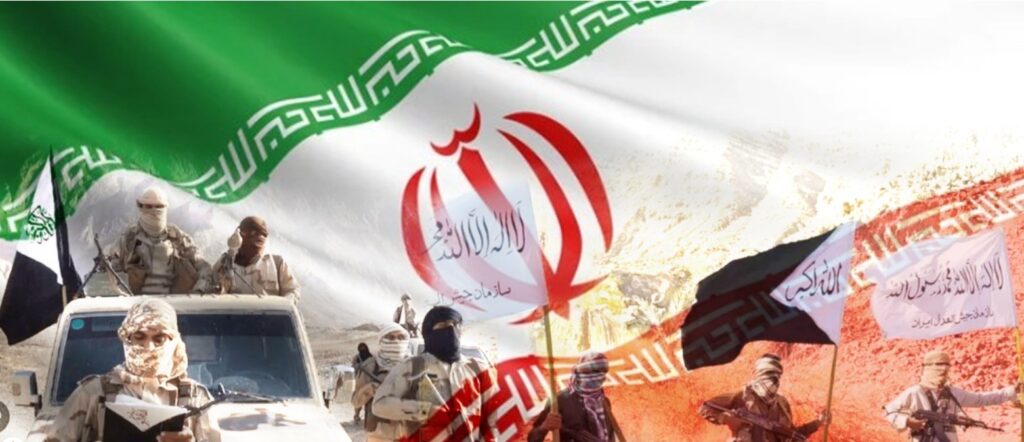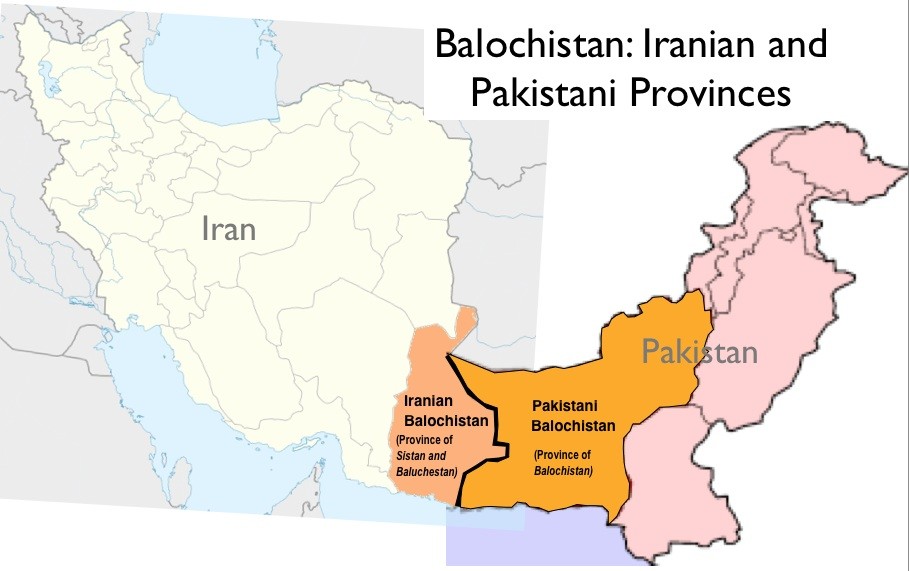Jaish al-Adl (JAA) The Army of Justice, referred to as the Army of Justice, is a Sunni militant group primarily active in Iran’s Sistan and Balochistan Province. Founded in 2012, it arose as a successor to Jundallah, a Baloch militant organization that had previously operated in the region and was considerably diminished after the Iranian authorities captured and executed its leader, Abdolmalek Rigi, in 2010.
This organization is designated as a terrorist group by Iran, the United States, Pakistan, China, Russia, Japan & New Zealand.
Since December 2023, JAA attacks on Iranian security forces have increased in sophistication despite Iran intensifying counter-terrorism operations against the organization. JAA is a Sunni Salafi Jihadist separatist organization that fights for the independence of the Baloch people in Iran and Pakistan. While JAA’s terror activity is confined to Iran’s Baluchistan-Sistan province, the terror organization has strong cross-border links with Balochi communities in Pakistan. JAA is significantly smaller than other Baloch separatist groups but has nonetheless sought to imitate the tactics of groups such as the Balochistan Liberation Army (BLA) from Pakistan.
Why was Jaish al-Adl Formed and What It Wants?
Jaish al-Adl was created with the stated goal of fighting for the rights of the Baloch ethnic minority in Iran, which has faced alleged discrimination, economic marginalization, and political repression.
Many fighters linked to the JAA are from Iran’s ethnic Baloch minority, which claims to advocate for Balochi rights and seek independence from the Islamic Republic. Following a Sunni Islamist ideology, they oppose the Shiite-led Iranian government, accusing it of persecuting Sunni Muslims, particularly in Baloch-majority areas. The Balochis make up about 5 percent of Iran’s population of approximately 88 million, mainly residing in Sistan-Balochistan province.
The main goals of JAA thus include advocating for the rights of the Baloch people in Iran, fostering Sunni Islamic governance within the region, putting an end to what they perceive as Iranian military oppression in Sistan and Balochistan, and pursuing increased autonomy or potential independence for areas with a Baloch majority.
Who Funds Jaish al-Adl?
Jaish al-Adl is thought to receive considerable financial support from affluent Baloch individuals in the Arab Persian Gulf, which is essential for the group’s operational effectiveness and longevity.
A significant portion of the group’s income is incidentally also derived from drug trafficking, as the organization is active along a crucial opium-smuggling route that extends from Afghanistan to Europe, taking advantage of the profitable drug market.
In the wake of the U.S. withdrawal from Afghanistan in 2021, various militant factions, including JAA, have reportedly obtained weapons from the black market, greatly enhancing their operational capabilities.
Iran has previously accused several foreign nations, including the United States, Israel, and Saudi Arabia, of providing support to JAA. While the State sponsors of JAA are an area subject to speculations in the media, this group has been reported to have recently launched an initiative to collect donations in the form of cryptocurrency on its website and Telegram channel.
Jaish al-Adl’s Adoption of the BLA’s Attack Strategy
Jaish al-Adl and the Baloch Liberation Army (BLA) exhibit similarities due to their ethnic connections and the regional environments in which they function, both advocating for the interests of the Baloch people. JAA operates within Pakistan’s Balochistan province, where the BLA is primarily active.
Despite these similarities, the two organizations are distinct, each possessing its own leadership and objectives. JAA mainly targets Iranian security forces, whereas the BLA concentrates on the Pakistani military. Currently, there is no formal alliance between the two groups.
Their geographical closeness may facilitate interactions that could result in tactical similarities. This was particularly evident in April 2024, when JAA executed coordinated attacks in three Iranian cities—Chabahar, Rask, and Sarbaz—focusing on defense and police installations. The BLA’s capability to conduct intricate operations in Pakistan appears to have influenced the tactics employed by JAA.

Geopolitical implications of Jaish-al-Adl’s operations
Jaish al-Adl’s activities have severely impacted Iran-Pakistan relations. Iran accuses Pakistan of sheltering JAA militants, resulting in cross-border incursions and Iranian retaliatory strikes on the group’s facilities in Pakistan. In January 2024, Iran launched missile and drone attacks on JAA positions in Pakistan, escalating tensions and drawing condemnation from the latter.
The group’s influence extends beyond Iran, as they support Sunni opposition factions in Syria and collaborate with Kurdish separatists in Iraq. This extensive network complicates regional security and underscores the connections among various militant organizations.
Jaish-al-Adl invites skepticism from Indian security agencies
While there is no definitive evidence linking India directly to Jaish al-Adl, India remains vigilant regarding the activities of militant groups in the region that could threaten its security interests.
Following the abduction of Kulbhushan Jadhav, an Indian national taken in Iran and later handed over to Pakistan’s Inter-Services Intelligence (ISI) by JAA, Indian security agencies have been closely observing the group’s activities in the region. Members associated with JAA reportedly had played a role in this incident, raising alarms about the group’s operations and its potential ties to Pakistan.
Conclusion
Jaish al-Adl continues to be a major destabilizing force along the Iran-Pakistan border, exacerbating ethnic and sectarian tensions and posing significant challenges to regional security. The group’s violent actions stem from the marginalization of the Baloch minority, highlighting the complexities of addressing ethnic separatism and religious extremism. To reduce support for such organizations, it is essential to tackle the underlying socio-economic and political issues faced by the Baloch community. Without effective intervention, Jaish al-Adl is expected to remain a persistent threat to peace and stability in the region.


